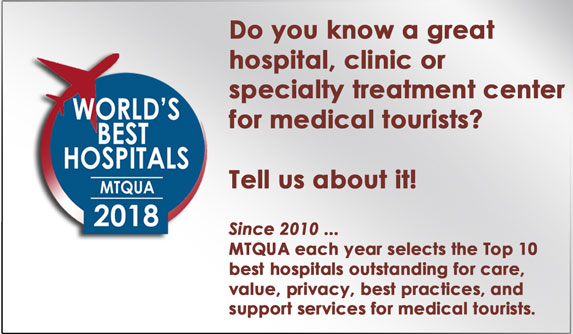 Medical tourism creates and encourages patients who are actively engaged in their own health care.
Medical tourism creates and encourages patients who are actively engaged in their own health care.
Medical tourists, by searching out options and choosing treatment abroad, are directly involving themselves in their own health care.
Health care providers in medical tourism often are not prepared for these patients. Some would rather not have such engaged patients, and prefer ones who don’t ask questions, don’t challenge fees and go along with whatever the doctor says.
Engaged is best
Engaged patients are like A+ students. Every teacher wants to teach the better students because they ask questions, do their homework, study hard, and actively participate in their education.
Engaged patients – in health care not marketing terms – are A+ patients. They do their homework. They ask questions of their doctors, take notes, follow medication instructions, and actively work at improving their health.
Engaged patients are often happier and more satisfied with their care, and recover better and faster.
Not wanted: engaged patients
Engaged patients are considered to be a desirable commodity in progressive health care circles. But outside these progressive circles is where most providers of treatment for medical tourists exist and where most medical tourism is practiced.
Engaged medical tourists may bring a side of the patient care process to their health care providers for which the providers are not prepared.
They present a daunting challenge to doctors and nurses who are nurtured in their medical schools to maintain the traditional hierarchical relationship between doctor and patient, and doctor and nurse.
Often social and religious customs are the underpinnings of these hierarchical relationships that are so common in medicine worldwide.
Even in countries like the U.S. with active programs for patient engagement, there are still health care professionals who are taken aback by these assertive and sometimes stubborn and demanding patients.
Dealing with unwanted engaged patients
Dr. Lewis G. Sandy, a senior executive at UnitedHealth Group, one of the largest health care companies in America, recently made several suggestions to health care providers and physicians in America on how to use the benefits that engaged patients bring to their care. His comments inspired these suggestions for providers of services in medical tourism.
Dr. Sandy exhorts providers and physicians to include those in the care chain who may have a stake in the patients’ continued well being. Break down the isolation that patients typically experience in a hospital and encourage cross-department treatment and care delivery.
Involve the medical tourist’s service chain
The task of helping medical tourists make choices about their health care goes beyond the confines of the physician-patient relationship. Involve other stakeholders in the medical tourist’s service chain and include them to help promote better healing and recovery for the patient.
In medical tourism, physicians and surgeons are fortunate in being able to call upon international patient managers in their own hospitals or medical travel facilitators from outside to assist in providing responsible care management for medical tourists who they treat. Physicians are often surprised at how much better recovery goes when the support community around the medical tourist gets involved.
Avoid isolating the medical tourist
Dr. Sandy advises to avoid siloed or one-off patient engagement programs that are disconnected from care delivery systems. A good example of patient services in medical tourism that are disconnected from care delivery systems is the health care checkup program.
A health care check up or executive health check promotion is one such independent, isolated or siloed program that tends to be kept separate from other hospital departments. It is often a one-off program that the hospital’s marketing team promotes. It seldom gives medical tourists an understanding or appreciation of what more the hospital can do for them either in the short time they have at the moment or at a later date.
Engaged medical tourists are profit centers
It may be that the intention of the health care check up is to identify and channel the medical tourist’s problems to other departments for treatment or care. If so, it is valuable to involve doctors, nurses, and international patient staff in the goals of the hospital. Otherwise, a conversation between the doctor and patient may omit a discussion about services the patient can utilize.
Perhaps the hospital should offer the medical tourist an incentive to book a treatment as a result of findings during the health check up. A discount of hospital costs, a free night, or other incentive that keeps the medical tourist from going elsewhere. An incentive directed at the medical tourist is more meaningful and appropriate than an extra commission given to the medical travel agent.
What other incentives can be used to create value added medical or wellness opportunities or experiences for medical tourists?

 >
>
One Response to The Medical Tourist As An Engaged Patient